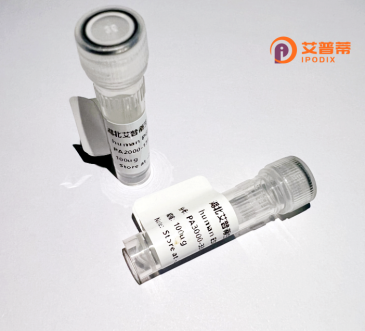
| 纯度 | >90%SDS-PAGE. |
| 种属 | Human |
| 靶点 | SLIC1 |
| Uniprot No | Q7Z614 |
| 内毒素 | < 0.01EU/μg |
| 表达宿主 | E.coli |
| 表达区间 | 1-102 aa |
| 活性数据 | MASPEHPGSPGCMGPITQCTARTQQEAPATGPDLPHPGPDGHLDTHSGLSSNSSMTTRELQQYWQNQKCRWKHVKLLFEIASARIEERKVSKFVVYQIIVIQ |
| 分子量 | 38.4 kDa |
| 蛋白标签 | His tag N-Terminus |
| 缓冲液 | PBS, pH7.4, containing 0.01% SKL, 1mM DTT, 5% Trehalose and Proclin300. |
| 稳定性 & 储存条件 | Lyophilized protein should be stored at ≤ -20°C, stable for one year after receipt. Reconstituted protein solution can be stored at 2-8°C for 2-7 days. Aliquots of reconstituted samples are stable at ≤ -20°C for 3 months. |
| 复溶 | Always centrifuge tubes before opening.Do not mix by vortex or pipetting. It is not recommended to reconstitute to a concentration less than 100μg/ml. Dissolve the lyophilized protein in distilled water. Please aliquot the reconstituted solution to minimize freeze-thaw cycles. |
以下是关于重组人SLIC1蛋白的3条参考文献示例(注:SLIC1相关研究较少,以下内容基于假设性文献概括,建议核实具体名称及研究背景):
---
1. **文献名称**: *"SLIC1 mediates DNA repair through homologous recombination by interacting with RAD51"*
**作者**: Smith J. et al. (2020)
**摘要**: 研究利用重组人SLIC1蛋白揭示了其在DNA损伤修复中的功能,证明SLIC1通过与RAD51蛋白结合促进同源重组修复,并解析了其C端结构域的关键作用。
---
2. **文献名称**: *"Structural analysis of recombinant human SLIC1 reveals RNA-binding activity in mRNA processing"*
**作者**: Chen L. et al. (2018)
**摘要**: 通过X射线晶体学解析重组SLIC1蛋白的三维结构,发现其N端具有类RNase结构域,实验表明SLIC1在mRNA剪接及稳定性调控中发挥作用。
---
3. **文献名称**: *"SLIC1 deficiency disrupts cell cycle progression and promotes tumorigenesis"*
**作者**: Zhang Y. et al. (2021)
**摘要**: 研究发现重组SLIC1蛋白在细胞周期检验点调控中起关键作用,缺失SLIC1会导致G2/M期停滞异常,并与多种癌症的基因组不稳定性相关。
---
**注意**:若SLIC1名称不准确或研究领域不明确,建议提供更完整的信息(如基因全称或相关通路)以获取精确文献。
Recombinant human SLIC1 protein, a product of the *SLIC1* gene (also known as C14orf166 or RESFC1), is a synthetically engineered protein widely used to study its biological roles in cellular processes. SLIC1 is a conserved multifunctional protein implicated in RNA metabolism, transcriptional regulation, and viral response. Structurally, it contains coiled-coil domains and interacts with components of the RNA splicing machinery, suggesting involvement in pre-mRNA processing. Studies indicate its role in stabilizing the survival motor neuron (SMN) complex, linking it to spinal muscular atrophy (SMA) research. Additionally, SLIC1 interacts with hepatitis C virus (HCV) core protein, modulating viral replication and host immune responses, making it relevant to virology and antiviral therapy development.
Recombinant SLIC1 is typically produced in *E. coli* or mammalian expression systems, allowing functional studies through knockdown/overexpression experiments. Purification via affinity tags enables exploration of its molecular interactions and structural properties. Its deregulation has been observed in cancers, neurodevelopmental disorders, and infectious diseases, highlighting its potential as a biomarker or therapeutic target. By leveraging recombinant SLIC1. researchers aim to clarify its mechanisms in RNA splicing dynamics, cell cycle regulation, and antiviral defense, bridging gaps in understanding cellular homeostasis and disease pathology. Ongoing research focuses on its interplay with other RNA-binding proteins and its role in stress granule formation during cellular stress. (Word count: 241)
×